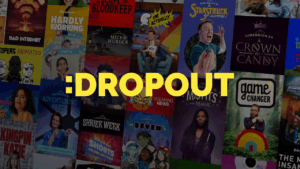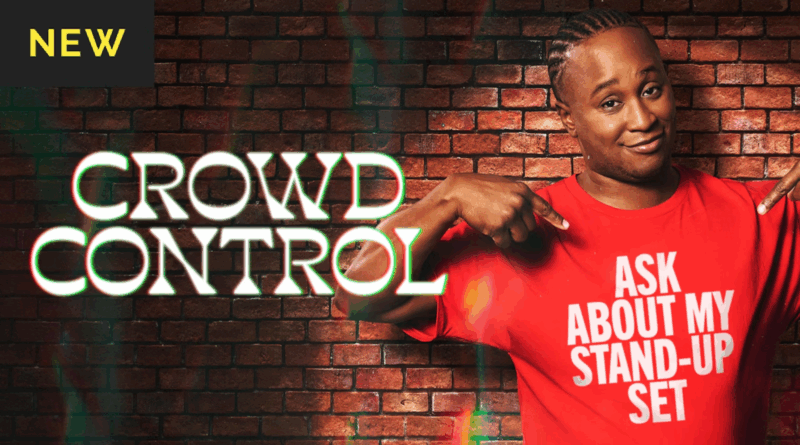Bartenderless Bar: A Review of Dropout’s Crowd Control
Dropout.tv charges $6 a month for an infinite collection of shows so funny they might make you pee yourself. Dropout began as CollegeHumor with hits like “What if Google was a Guy” and “Are you Asian Enough?” It focuses on bringing comedy that consistently punches up in a world hellbent on punching down. Dropout refuses to give voice to those who make cruelty their comedy. Instead of poking fun at marginalized communities, Dropout makes them comics. Viewers laugh with them, instead of at them. Their comedy makes commentary on the world around us all while seeking the best for its cast and crew. They are among the few in show business who pay actors for auditions and share profits with workers as part of their compensation package. Dropout hosts a game show called Game Changer. True to its name, the game that the contestants play is always changing. On occasion, contestants on Game Changer play games that cannot be fully explored in one episode, leading to returning games and spin-offs. Crowd Control is the latest spin-off, in which three comedians compete for a golden drink ticket to an unmanned bar, using the audience as fodder.
Crowd Control consists of three rounds. In the first round, comedians ask the audience for fun facts about themselves to make jokes about. In the second round, members of the audience remove their first layer of clothing to reveal black shirts with facts about themselves, with phrases like “famous flight attendant” or “coven destroyer.” In the last round, the remaining members of the audience remove their first layer to reveal red shirts with less fun facts about themselves, like the person wearing a “famous family member” shirt, who turns out to be related to serial killer Robert Durst, or “hot chocolate incident,” a person who needed genital reconstruction surgery after a third-degree burn. In the final round, all three comedians share the stage; they are allowed to build upon one another’s jokes by stealing the microphone and picking up where the previous comedian left off.

Between rounds, the host of the show, Jaquis Neal, will give comedians specific tasks to work into their jokes. Many of the prompts given have a direct connection to what’s happening in the world. In the first official episode of Crowd Control, Neal challenges Bob the Drag Queen to deliver his set as if he were in a library. Bob the Drag Queen then focuses on a man with a Hispanic man with a “fake founding father” shirt. In a monotone, Bob makes a joke about the lack of diversity throughout history. Leah Rudick must do a comedy set as if she “were just publicly cancelled.” What she delivers is a hilarious commentary on the sexual harassment and racism common in the entertainment industry. When she makes a call back to the hot chocolate incident and the crowd boos her, she is shocked, claiming it’s the “least offensive thing [she’s] said so far.” Brennan Lee Mulligan’s famous sesquipedalianism is made fun of when he must keep from using “big words” as defined by the audience. He finds a NASA employee in the crowd and, in caveman speech, praises the work the employee does for the public. Mulligan ends his set by saying, “Don’t need to be that smart to see shit fucked up.” Every challenge is different throughout the series, depending on what the comic might find most difficult, keeping the show fresh while tailoring it to the comics, audience, and viewers alike.
While the premise of the show is ostensibly to make fun of the audience, Crowd Control never feels mean-spirited. In reality, it is a collaboration between the comedians and the members of the audience. The comedians have the heavy responsibility of leading with curiosity and kindness, while deciding how much they can push uncomfortable conversations for the sake of comedy. The host provides challenges that force comedians to make fun of themselves as well, evening out the power differential between the comedian and the audience. Everyone is opening themselves up to humiliation; everyone is opening themselves up to being laughed at. Everyone works together to make something hilarious for those watching, both streaming and in person.

Each episode features three new comedians. These comedians are both unknown and famous. Paul F. Tompkins and the aforementioned Bob the Drag Queen have both been featured, as well as homegrown comedians like Brennan Lee Mulligan and more niche comedians like Jamie Loftus. Every comedian featured is in a different place in both their career and their lives, which allows for diversity of thought and content. It doesn’t shy away from trans, Black, femme, masc, poly, or any other identity. Each person has their own voice, but those voices meld beautifully with the other comedic voices surrounding them. There is something for everyone.
The world around us is increasingly going to shit. Comedians have started punching down on vulnerable members of society. Matt Rife uses victims of domestic abuse as the punchline in his jokes; Dave Chappelle harasses transpeople. Anyone who does otherwise is punished. Jimmy Kimmel’s show has been suspended for his opinions on Charlie Kirk; Stephen Colbert was cancelled for being too harsh with right-wing ideals. Homogeneity is seen as more and more valuable. People of different cultural, religious, and ethnic backgrounds are in increasing danger as fascism rises. Everything can be a weapon for fascism — but that also means anything can be a weapon against it.
Crowd Control is a powerful weapon to battle increasing right-wing thought. Instead of villainizing the differences between people, it goes against the grain by celebrating them. It allows people to find common ground through laughter. In order to win, fascism needs to be taken seriously. Laughing at it, making jokes of it, steals its power. This is even more true when the people mocking it are the people it seeks to oppress. Like so many of Dropout’s shows, Crowd Control elevates marginalized voices and allows them to be joyful when joy is so difficult to find.

